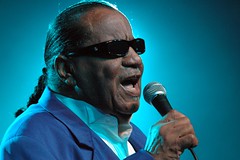[this is a version of a post which first appeared on my blog From the Front of the Choir]
There are quite a few choirs out there made up entirely of blind singers. There are also many famous individual blind singers (Stevie Wonder, Andrea Bocelli), groups (The Blind Boys of Alabama) and even whole traditions of blind music-making (the Kobzarstvo of Ukraine).

It’s clearly possible to sing without being able to see, so why would a singer feel that they have to give up singing if they were to lose their sight?
One Saturday morning I was listening to Saturday Live on BBC Radio 4. A listener, Annie Rimmer, was talking about her Inheritance Tracks: the music that she had inherited from another person, and the track that she would like to pass on. For the latter she chose part of Monteverdi’s vespers of 1610: Nisi Dominus.
Annie has a disease which means that she is slowly losing her sight. Despite this, she joined a local choral society a few years ago. She said:
“It thrills me to sing with that group of people. There are about 150 of us, all of us amateurs. You’re all equal. It doesn’t matter whether you’ve got the most beautiful voice or the most average voice, everybody’s got a part to play. It’s the totality, everything coming together, that’s such an amazing experience”
What a brilliant way to sum up the joys of singing in a choir!
Annie had sung the Monteverdi at a concert which coincided with her 50th birthday and said that she couldn’t keep the smile off her face.
“It’s so joyful. It’s not about the words, it’s about the music”
Because she is losing her sight, it takes Annie many, many hours to prepare the music so that she can see it. However, she knows that she’s not going to be able to do that forever.
“I know that there’s going to come a time over the next few years when I’m going to have to stop. I know that’s going to feel like the most enormous loss”
Having discovered the joys of singing and the obvious pleasure it gives her, this was the point in the programme that made me very sad and angry!.
WHY does Annie have to give up singing in a choir???!!!
Once again someone has been led to believe that they have to have a written score (and be able to read it) in order to sing.
Other than the most complex of pieces (see Complex songs and learning by ear), almost every song can be taught and learnt by ear. Even relatively complicated pieces and those in several harmony parts. In fact, when the rhythms of a piece are very difficult, it’s often easier to learn by ear!
Having heard the complexity of the Monteverdi piece that Annie Rimmer mentions, I am convinced it would be possible to learn by ear.
But if Annie finds the local choral society’s repertoire to be too difficult, then she could easily find a local Natural Voice choir to join.
We have become a very visual culture over the last few centuries. There is nothing wrong with this, and I delight in the movies, the written word, fine art, etc. But we are in danger of forgetting how to listen.
Particularly when so many of us live in urban areas, we seldom take the time to really listen to the many rich and fascinating sounds that surround us. There is no greater joy than listening to the ‘silence’ in the countryside at night.
When we go to choir and use written scores, we can easily start to rely too much on our eyes and forget to listen to the music, the other singers, the acoustic, the environment. Music is after all about sound.
If you always use written music, why not go to a workshop and learn by ear just for a change? Try putting the music down when you’re not singing and really listen to the other parts. Close your eyes occasionally and focus on different aspects of what you can hear: your own voice, the person next to you, the altos, the song as a whole, the echo.
It’s so easy to forget that music as about sound and listening, and not about written music and looking.
Chris Rowbury: chrisrowbury.com
As for the blind chorister being able to respond to the conductor in the moment, well it’s quite complex Chris and mainframeguy. One of course has many rehearsals to follow and learn the conductor’s directions. One has friends who will q... more